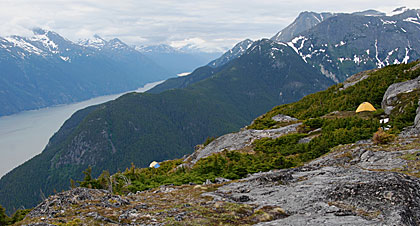Physical and Mental Preparation
 A hunter must be physically able to hunt responsibly. In Alaska, hunting demands intense physical preparation. More than twice as large
as Texas, Alaska has fewer road miles than Delaware. As a result, most big game hunting in Alaska is more along the lines of an expedition
than the type of hunting to which most people are accustomed. Typically, you have to walk from the drop-off point to where you will hunt
and pack out anything you kill. This can mean walking for several days while hunting for a game animal. It may mean a difficult climb up
a mountain each day. Often, it can also mean walking through muskegs and dense alder thickets, and crossing creeks.
A hunter must be physically able to hunt responsibly. In Alaska, hunting demands intense physical preparation. More than twice as large
as Texas, Alaska has fewer road miles than Delaware. As a result, most big game hunting in Alaska is more along the lines of an expedition
than the type of hunting to which most people are accustomed. Typically, you have to walk from the drop-off point to where you will hunt
and pack out anything you kill. This can mean walking for several days while hunting for a game animal. It may mean a difficult climb up
a mountain each day. Often, it can also mean walking through muskegs and dense alder thickets, and crossing creeks.
Even if you are lucky and find an animal within a mile of your camp, there is a lot of work involved in cleaning and packing out that animal. For example, if you are a successful moose hunter, you will have to pack out all the edible meat – which could total over 500 lbs (227 kg). One hind quarter alone may weigh more than 125 pounds (57 kg). Experienced Alaskan hunters say that the work really begins once an animal is killed.
Your hunt will be far safer and more enjoyable if you get into good health and physical condition ahead of time. Talk to your doctor, a physical trainer or an athletic coach for help in making a specific plan to prepare you for your hunt. You should be physically prepared, at a minimum, to carry a pack weighing 1/4 of your body weight for several miles through rough terrain, or hunt with others who can. We suggest that you begin a conditioning program at least 4 to 6 months before your hunt. Thirty minutes per day of jogging, bicycling, swimming, or weight lifting can help you prepare; however, the best exercise is simply donning a weighted pack and hiking. If you are going to hunt in mountains and none exist near you, walk up stairs or stadium steps. For conditioning purposes, begin with a pack weighing roughly 1/10 your body weight and work up to a pack weighing about ¼ your body weight.
Besides physical conditioning, hunting in Alaska demands far more logistical planning than almost anywhere else. Weather plays a major role and must be factored into any plans. You must be self-reliant, capable of remaining in the field longer than expected under difficult circumstances. Services and creature comforts are few. Inadequate planning, poor preparation or underestimating the wilderness can lead to a miserable or even fatal hunt. For guidance, we recommend using the Alaska Hunt Planning Worksheet (PDF 17 kB) .
You also must have realistic expectations. When hunting in Alaska, success is not guaranteed. In fact, given the climate extremes, the state’s habitat is much less productive than many places with lesser hunting reputations. Hunting here can be tremendously rewarding or immensely disappointing: The extent to which you are well prepared for contingencies, together with your approach to defining success, will have a large bearing on which it will be for you.
